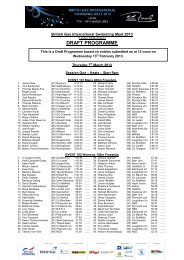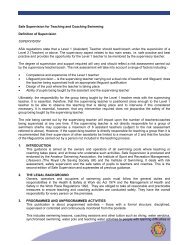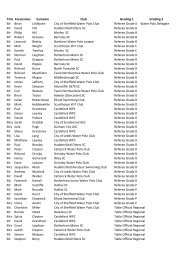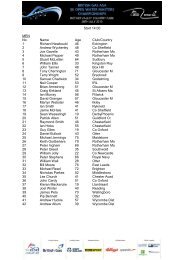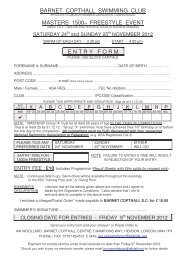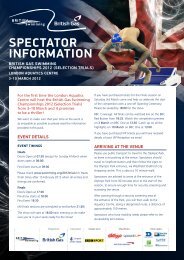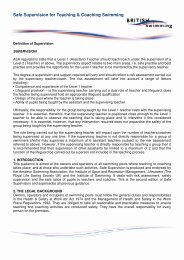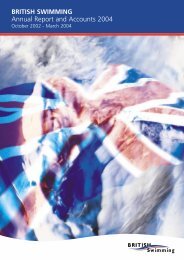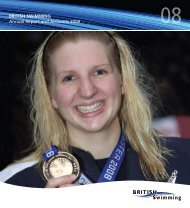The ASA Handbook - Swimming.Org
The ASA Handbook - Swimming.Org
The ASA Handbook - Swimming.Org
You also want an ePaper? Increase the reach of your titles
YUMPU automatically turns print PDFs into web optimized ePapers that Google loves.
Regulations for the Payment of Expenses by the <strong>ASA</strong><br />
54<br />
REGULATIONS FOR THE PAYMENT OF<br />
EXPENSES BY THE <strong>ASA</strong><br />
<strong>The</strong> payment of expenses shall be subject to the authorisation of the person responsible<br />
for the finances of the activity, hereafter referred to as the designated officer.<br />
<strong>The</strong> <strong>ASA</strong> requires that all claims submitted are accompanied by receipts showing the<br />
payment, and where appropriate, any VAT with a VAT registration number. (For this<br />
purpose Switch and credit card slips are not acceptable.) Claims submitted without<br />
receipts may result in a delay in payment.<br />
For the guidance of members, the following expenses shall normally be considered for<br />
payment:<br />
Essential travel for business purposes<br />
1. Rail Travel and Public Road Transport – standard fare or discounted fares that are<br />
available and suitable.<br />
2. Taxis – actual fare, provided that reasonable public transport is not available.<br />
3. Air Travel – Economy class or lowest prevailing fares available.<br />
4. Private Car:<br />
Up to 10,000 miles – this will be subject to HMRC Guidelines<br />
Over 10,000 miles – this will be subject to HMRC Guidelines<br />
Assembly Costs for Athletes<br />
1. Rail Travel and Public Road Transport – standard or discounted rail fare for one<br />
return journey from an athlete’s place of residence to an agreed assembly point.<br />
2. Air Travel – Internal flights may be arranged at the discretion of the <strong>ASA</strong> on behalf<br />
of athletes.<br />
3. Private Car – as per the current guidelines held by the Director of Finance.<br />
<strong>The</strong> following conditions apply to these rates:<br />
1. <strong>The</strong> rates are in line with HMRC approved mileage rates for use of a private vehicle<br />
on company business. <strong>The</strong> decision of the <strong>ASA</strong> to move the volunteer mileage rate<br />
in line with HMRC rates does NOT imply any employer/employee relationship<br />
between the parties. <strong>The</strong> <strong>ASA</strong> mileage rate is intended to cover travel expenses<br />
incurred whilst undertaking voluntary activity on behalf of the <strong>ASA</strong>.<br />
2. <strong>The</strong> <strong>ASA</strong> does not take any responsibility whatsoever for the tax status of volunteers<br />
with HMRC. This is the sole responsibility of the individual. Specifically,<br />
should a volunteer claim more than 10,000 miles at the recommended HMRC<br />
guidelines from both their ordinary employment plus any <strong>ASA</strong> and other volunteer<br />
activity, the volunteer is responsible for the tax position arising. <strong>The</strong> <strong>ASA</strong> does not<br />
undertake to log the total mileage of its volunteers – only that mileage incurred on<br />
<strong>ASA</strong> office.<br />
3. Economy class air travel by Volunteers may only be made by prior agreement and<br />
must be booked via the <strong>ASA</strong> office.<br />
4. Assembly costs for Team staff and athletes.<br />
5. Standard or discounted rail fare from normal training venue to assembly point and<br />
return. Internal flights may be arranged at the discretion of the office for swimmers<br />
and athletes.



